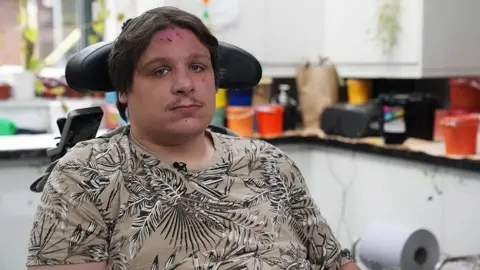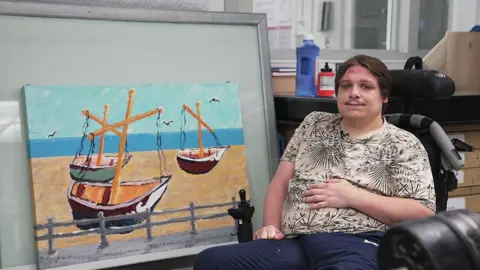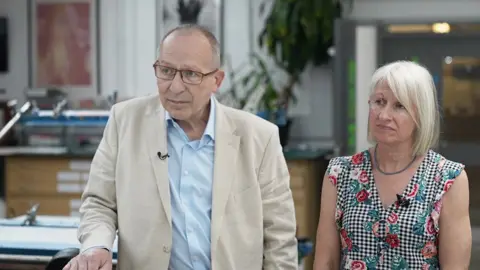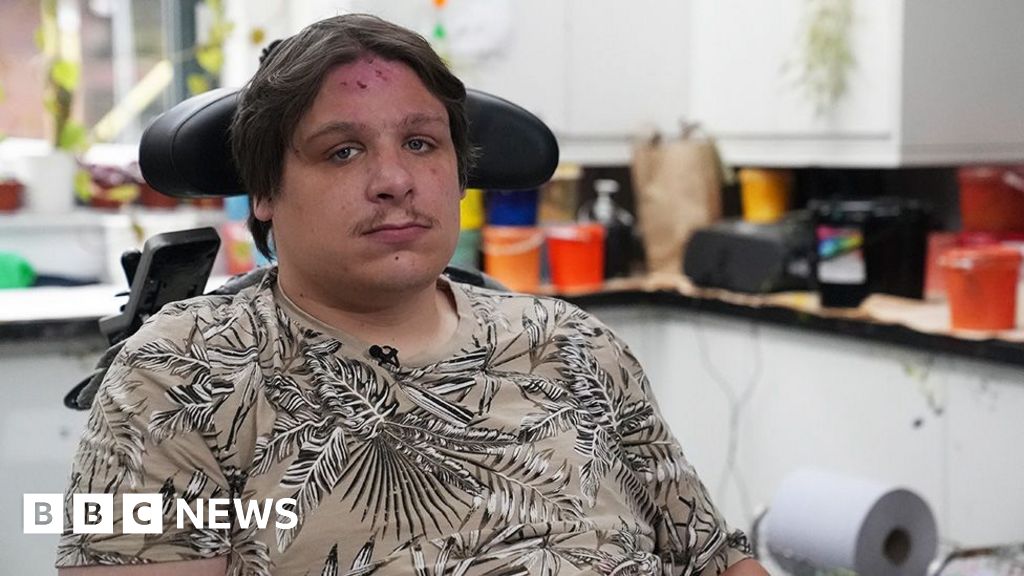 BBC
BBCA disabled man has spent nearly 10 months in a busy general hospital because no suitable home has been found for him in the community.
Matthew Sharp, who has a range of complex conditions, says he has been left in limbo while his local NHS and council try to decide who is responsible for his care.
Council bosses in England say disputes between the NHS, local authorities and families over who should pay for the most complex care cases are increasing.
Matthew’s local health and care system says it works with individuals, families and others “to understand the type of care an individual needs”.
Following several BBC reports over the past year, more than 250 people have contacted us raising concerns about NHS-funded social care – including Matthew and his family.
The 36-year-old has been in Epsom General Hospital in Surrey for more than 290 days – for most of that time he has been medically fit to leave.
“I’m just stuck in a prison basically,” Matthew says. “Life is very difficult, life is sad, and I’ve got a lot of anger.”
His family says that the situation has caused his health to deteriorate.
Matthew has Tourette’s syndrome. It causes tics or involuntary spasms, some of which have been so violent they have damaged his spine – the reason he is now in a wheelchair.
Another tic means he involuntarily calls out and repeats words – sometimes the words can be offensive. He says his tics have become “more chaotic” because of the stress he is under.
He also has a learning disability and a range of additional physical and mental health conditions, including ADHD and Obsessive Compulsive Disorder (OCD).
On 6 October last year, Matthew was taken to hospital with a urinary tract infection.
He had been in supported housing, but that placement had broken down, so he was not able to return.
Since then, Matthew has been living in a side room in the hospital. He finds the constant noise and being on a ward with extremely sick people very stressful.

We are meeting at the University for the Creative Arts near the hospital. Matthew is a talented artist and his parents have brought one of his paintings with them.
He manoeuvres his wheelchair so he can get a better look at the picture which shows three boats jumbled on a bright yellow strip of beach.
The sea and sky are vibrant blue, but Matthew points to the grey railings and pavement that run across the bottom of the picture.
“That represents my life,” Matthew says. “The barrier preventing me doing the things I want to do.”
His parents, who have their own health issues, describe the situation as extremely distressing.
“Matthew is now in that position whereby he’s not really seen as an individual,” says his mother, Christine. “He has no meaningful life.”
Matthew’s support was being funded by NHS Surrey Heartlands Integrated Care Board (ICB) under a scheme called Continuing Healthcare (CHC). Only people with the highest needs are eligible for this free NHS social care.
After nearly two months in hospital, he received a letter from the ICB saying it had tried 145 different homes providing care and support. They identified three which could potentially take him.
The ICB now says the family declined a number of suitable options before reaching this more formal stage.
Matthew’s parents strongly dispute this. They also say one of the three homes listed was ideal but in the end no place was offered.
When the ICB wrote to Matthew again on 4 December 2023, he was told there was just one home where he might be able to live.
The family says the home was totally unsuitable for someone as vulnerable as Matthew, with drug-dealing happening openly on the street outside.
The ICB letter said it believed the placement met “his assessed needs”, and should he refuse it then “this means that you decline CHC funding and make your own private arrangements”.
CHC funding was withdrawn on 21 December. The ICB says it made a referral to Surrey County Council for it to provide his care.
The council says it was made aware of Matthew’s case in December but did not become involved until May.
Matthew’s disabilities – and being on benefits – mean that if his care is not funded by the NHS, then it should be provided by his local authority.
But in the following months, neither seems to have taken on the job of finding him somewhere to move to.
It is a complex case, but we have not been given a clear answer as to why this happened.
The consequence for Matthew is he is stuck in hospital.
The estimated cost of a standard NHS hospital bed in 2020/21 was nearly £2,500 a week.
Matthew’s mother, Christine, describes the current situation as “not fair on anyone”.
“The amount it must be costing to keep Matthew in a hospital bed should be being spent on somewhere that he is able to live his own life and enjoy,” she says.

In May this year, eight months after Matthew arrived at the hospital, the ICB says health staff requested a review to see if he was still eligible for NHS-funded Continuing Healthcare.
Official guidance says the threshold for this screening process “has been set deliberately low, in order to ensure that all those who require a full assessment for eligibility” have that opportunity.
It also says people should be given reasonable notice when this is to happen. Experts say that would usually mean a few days.
Matthew’s family says he was given just 10 minutes’ notice that an assessment or “checklist” would be carried out.
He called his parents, who live an hour away. They couldn’t get there in time to support him. He says he asked for the checklist to be delayed but was told it would go ahead without him.
We compared the checklist against previous multi-disciplinary assessments of Matthew’s health and care needs. There are significant differences.
In the checklist, his Tourette’s syndrome is mentioned in passing, and there appears to be little acknowledgement of the severity or impact of his tics.
There is also no mention of his ADHD, OCD, or the deep brain stimulator which is used to help control his tics, and which he requires help with.
The checklist was completed using hospital notes. The ICB says it was undertaken in line with the national framework, with health professionals involved in Matthew’s care.
But the family says the member of staff involved was new and did not know him.
“It just made me upset. So basically, they’re not listening,” says Matthew.
His family says his health has deteriorated since he was last assessed, but the conclusion of the checklist was that he was no longer eligible for CHC.
Claire Stone, NHS Surrey Heartland’s chief nursing officer says while it cannot comment on individual cases, it works closely with those involved to “provide support and advice and ensure a smooth transition to any new arrangements”. She also says “anyone who chooses to decline CHC care” can reapply at any time.
Surrey County Council says it began plans for Matthew to be discharged to a permanent home in June, adding that “at the heart of this complex case is an individual and it’s important that Matthew’s needs are put before anything else”.

Councils provide means-tested support for people at home, in care homes or supported living, if they are found to have high care needs rather than health needs.
A recent survey by the Association of Directors of Adult Social Services (Adass), representing the people who run council care, says care staff are increasingly being expected to take on tasks once done by health professionals.
Out of 153 English councils with social care responsibilities, 143 replied. Nearly three-quarters (74%) reported a rise in local disputes over whether councils or the NHS should fund a person’s care.
They also say care staff are increasingly being expected to take on tasks which would have once been done by health professionals.
And with their own budgets under pressure, nearly all directors say they have little confidence they will be able to meet their legal duties to support people in the year ahead.
Tom Brown, who speaks for Adass, says the current situation is not sustainable: “I think local authorities are being made the provider of last resort for people with some of the most complex needs.”
He says investment in community services is needed to allow health and social care “to make a profound difference in people’s lives”.
Matthew’s parents describe the existing health and care system for people like him as broken.
“The impact it has is to destroy lives,” says his father, Roger. “It is destroying Matthew’s life, and it is severely impacting on ours.”
However, Matthew remains optimistic. He wants to become a well-known Tourette’s artist – doing abstract art and installations, and inspiring others.
“I’m actually looking forward to the future,” he says. “But I need to be out of hospital, to actually gain my future.”
The Department for Health and Social Care says it is “determined to tackle head-on the significant challenges social care faces” and it will undertake a “deep-rooted programme of reform”.


